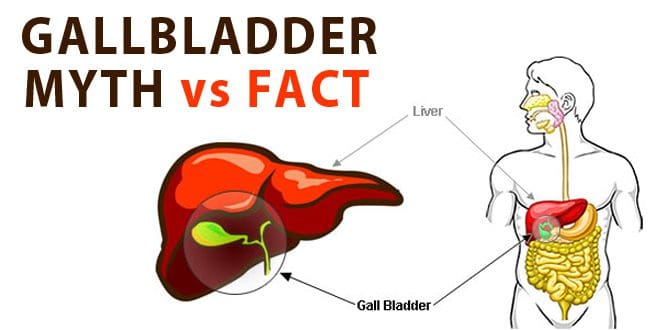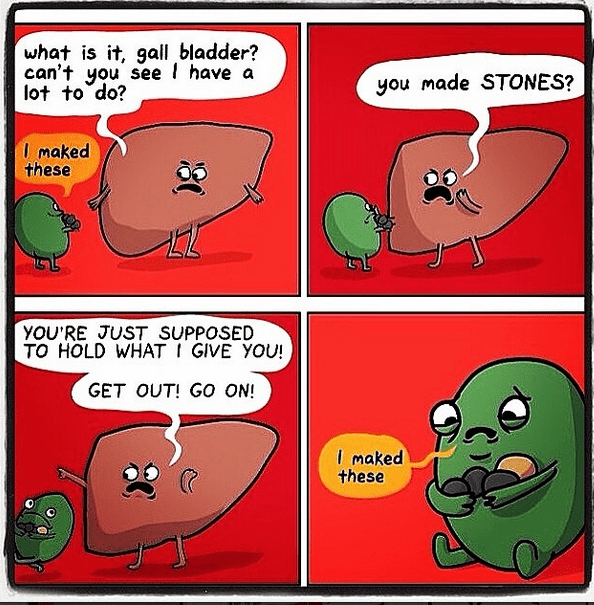Gallbladder problems are incredibly common – 10 to 15% of Australians develop a gallbladder problem at some point in their life. Half a million Americans have their gallbladder surgically removed annually.
Gallbladder removal is one of the most common hospital procedures. In many cases it was unnecessary and the patient was rushed into surgery when safer alternatives are available.
Common misconceptions
Myth – You need to follow a low fat diet to prevent or shrink gallstones.
Fact – The opposite is true. A low fat diet actually encourages the formation of stones because low fat diets promote bile stasis and excess carbohydrate is converted into fat in the liver. A fatty liver is less able to make healthy bile. You need to eat some fat in order to flush the gallbladder clean and avoid stagnation of bile. Excess sugar and carbohydrates are bigger problems for the gallbladder than fat is.
Myth – People with gallbladder disease should avoid saturated fat.
Fact – Many commonly consumed saturated fats are composed of short and medium chain fatty acids. These fats do not require bile for their digestion; therefore do not place a strain on the gallbladder. For example coconut oil and ghee are saturated fats predominantly composed of medium and short chain fatty acids respectively, and are okay to eat.
Myth – A gallbladder flush is the best way to get rid of gallstones.
Fact – A gallbladder flush is not for everyone. If you are already in pain, it can make the pain significantly worse, and even lead to an emergency trip to hospital where you’d likely return without your gallbladder. It doesn’t address the reasons why you got gallstones, so they are likely to return. The size of the common bile duct is on average only 5mm wide – many gallstones are much bigger than 5mm – thus if you try to flush them out through the common bile duct they will get stuck – ouch!!
Myth – It doesn’t matter if your gallbladder is removed. It’s not an important organ and you can be perfectly healthy without it.
Fact – Yes, it’s true that you can survive quite well without a gallbladder, but you are at greater risk of developing certain liver conditions. You will also have impaired fat digestion and probable deficiency of fat soluble nutrients such as vitamins including vitamins D, K, E and A, as well as essential fatty acids.
Myth – Having your gallbladder removed will stop the pain and then you can eat whatever you like.
Fact – This is not the case for many people. Some people experience even worse symptoms after their gallbladder is taken out – IBS or chronic diarrhoea. Either way, removing the gallbladder does not address the underlying metabolic abnormalities that caused a person to develop stones in the first place.
Myth – You can’t do a liver detox if you don’t have a gallbladder.
Fact – Yes, you can do a liver detox and it is critical to take good care of your liver in order to avoid developing stones within the liver and other liver disorders. Fatty liver disease is very common in those who have had their gallbladder removed.
Myth – It is normal and expected that you’ll have digestive problems such as irritable bowel syndrome or diarrhea after having your gallbladder removed and it’s just something you’ll have to live with.
Fact – No it isn’t. There are ways to ensure good digestion and help you be symptom free. Many people spend the rest of their life with digestive problems but there are ways to overcome this.
Gallstones are not always caused by an abnormality of the gallbladder; they are caused by problems with the liver and digestive system, which promote the production of unhealthy bile, which is then more likely to form stones. Digestive problems can also interfere with the ability of the gallbladder to contract, thus further encouraging stone formation and inflammation of the gallbladder.
Natural ways to help overcome gallbladder problems
- Best foods for gallbladder – beetroot and beetroot leaves, fresh herbs, lemons, limes, apples.
- Apple cider vinegar – choose organic variety
- Milk thistle, turmeric, globe artichoke, peppermint, taurine, glycine
- Avoid being constipated
- Lower carbohydrate diet
- Digestive enzymes and ox bile capsules with meals
- Avoid gluten, sugar and deep fried foods. Stir fry is fine. Find out if you have other food sensitivities – they can interfere with Cholecystokinin production which disrupts proper gallbladder emptying.
For more help see my book titled – Save Your Gallbladder and what to do after you have lost it




Thank you for this great post! This list is highly appreciated and the cartoon is cute and funny 🙂